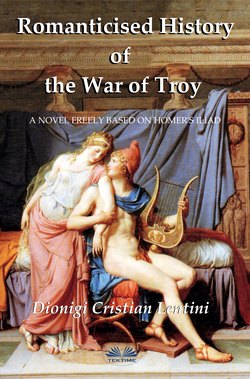Читать книгу Romanticised History Of The War Of Troy - Dionigi Cristian Lentini - Страница 6
Paris' judgment and return to Troy
ОглавлениеDuring the journey Aphrodite, unbeknownst to the other goddesses, managed to seduce Hermes and steal the secret of Paris from him, revealed that night to the god by his son Pan: the young shepherd was actually Alexander, prince of Troy, son of Priam and Hecuba. His parents had abandoned him at birth on Mount Ida, as an oracle had prophesied their son would cause the fall of the entire kingdom of Troy. King Priam, unable to be the cause of his son’s death, had ordered that he be left on that mountain known to all for the harsh winters and the presence of wild beasts.
The little boy, sent to meet his certain death, was nursed and protected by a large bear and then cared for and raised until he was strong and beautiful by a family of shepherds who, following the bear, had discovered the den and fortuitously also the newborn in the basket.
When Hermes and the three goddesses joined Paris, he was in the shade of an oak tree playing his fistula of seven canes, watching over his flock with satisfaction, unaware of the incredible visitation.
Having revealed herself to the young man, Hera began by saying that, being that it was her privilege to dispense wealth and power to mortals, if she received that prize she would make Paris the richest and most powerful of men.
Athena, on the other hand, in exchange for the apple offered intelligence, wisdom and valor in life and war.
Finally Aphrodite appeared, more beautiful than ever; explained to Paris that he already possessed all that her competitors offered him because he was actually already the son of a rich and powerful father and he already had all the promised gifts and his noble origin soon would be revealed to him. Aphrodite, on the other hand, offered him the love of the most beautiful mortal woman that no man's eyes could resist.
Paris half-closed his eyes, in his mind he saw wealth and power, he was fascinated by the highest wisdom, but with the image of Helen, the woman promised by Aphrodite, he could not help but instantly fall in love and all else dissolved like clouds in the sun; he then opened his eyes and, now blinded by love, without hesitation handed the apple into Aphrodite's hands, disregarding the scorn and threats of Hera and Athena who, defeated, withdrew.
Hermes immediately ran to inform Zeus of the choice Paris had made, while Aphrodite promised the young shepherd that he would soon know his noble lineage and love; however, he would have to race to retrieve the robe that wrapped his infant body in the basket and leave for Ilion as quickly as possible, the splendid capital also called Troy; there he would be registered in the games in the kingdom, where a fat bull was the prize, that days before the king's soldiers had confiscated the livestock from the one who believed to be his father.
Paris, bewitched and dreamily obeyed without delay and, with a rough spear, a bow and its characteristic fistula, finally reached Troy, the "city with golden walls". It stood on a pleasant hill between the Hellespont and the Aegean Sea. At the foot of the hill flowed two rivers, the Scamander to the west and the Simoenta to the north.
There, with Aphrodite at his side, he beat all the participants in the tournament, one after the other, under the eyes of the rulers and Prince Hector, the strongest and most valiant Trojan hero.
At the time of the award ceremony, the winner approached the royal stage to receive Priam's investiture and blessing, but, when he was about ten paces from the king's seat, Princess Cassandra let out a shrill cry of distress; Priam and his lady froze, recognizing only in that moment the clothes the young man wore; only then did they realize that the battered shepherd from Mount Ida, armed with humble weapons but capable of beating all the strongest Trojan nobles, could only be their beloved son Alexander, abandoned tearfully twenty years earlier.
There were festivities in Troy for another 7 days and 7 nights and, despite the initial envy and the dull grudge held by his fifty brothers, twelve sisters and young Trojan nobles, Paris soon managed to be valued and loved by everyone, especially by Hector, his older brother. Only Cassandra continued to distrust and curse whenever she had the occasion to meet up with him, inciting his father and his people several times to ban him from the city before the fatal prophecy could be fulfilled: Troy would be destroyed and his family exterminated in the flames. Cassandra, in fact, at a young age, for having refused to return the love of the god Apollo, had been condemned by divine will that no one would ever believe the prophecies her divine lover inspired in her. The unhappy princess was able to predict all the disasters that affecter her people in time but every time no one trusted her or accorded her their trust, in fact everyone avoided her and considered her not quite sane.
